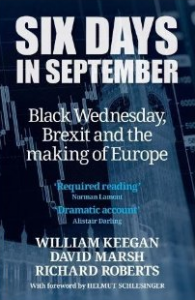
Black Wednesday and Brexit

Six days in September gives numerous insights and paints a fascinating picture by highlighting the crash of sterling out of the exchange rate mechanism, and how the UK steadily distanced itself from European Monetary Union and EU with Brexit. Britain joined out of desperation at too high a rate and in secrecy without any regard for the implications of German reunification. Then the cabinet was given an inaccurate explanation only two weeks later. At the end, even when the pro-Europeans were still most reluctant to leave even after all our reserves were close to enervation.
This book also makes an exciting reading of Black Wednesday, by stripping bare events and personalities that led to and followed Black Wednesday and which shaped UK’s attitudes to the Euro and the European Union, as it underlines the contrast between the UK desire to use ERM membership primarily for shorter-term purpose of reducing inflation, and other countries’ ambition to move towards the single currency. An Argument between the then chancellor Norman Lamont and the Bundesbank chief provided one of the triggers for the crisis. Schlesinger’s cavalier talk to the media about Sterling’s vulnerability offered speculators a sure bet. Twenty-five years from the disastrous extraordinary day that broke the Bank of England, and allowed £1bn into the of currency speculator George Soros and within hours crippled Major’s government was a laughing stock without any political credibility. The authors make the argument that the government chose the wrong moment to tether sterling and at too high an exchange rate. The Treasury had used most of the 1980s trying to control inflation by fixing targets for the money supply.
Then followed Tony Blair’s sweeping election victory of 1997. The Conservative Party’s hold on Europe was broken although it was Harold Macmillan who first proposed EU membership and Edward Heath who oversaw entry. Brexiters Michael Gove and Boris Johnson were Tory rebels of the 1990s who Major called them the cabinet’s “bastards”. France and Germany went ahead and formed the single currency as sterling became a badge of sovereignty for Euro-skeptics.

Between September 15, 1992, and June 23, 2016, when John Major’s government was laid low by
Sterling’s ejection from the European Exchange Rate Mechanism to the referendum conceded by David Cameron that saw British vote to leave the European Union.
While Britain has been devaluing the pound for the last 70 years, Germany strengthened their currency and so their relative economic performance is much more enhanced.
Six days in September: Black Wednesday: Brexit and the Making of Europe by William Keegan, David Marsh, and Richard Roberts. OMFIF Press, £20, 208 pages.
